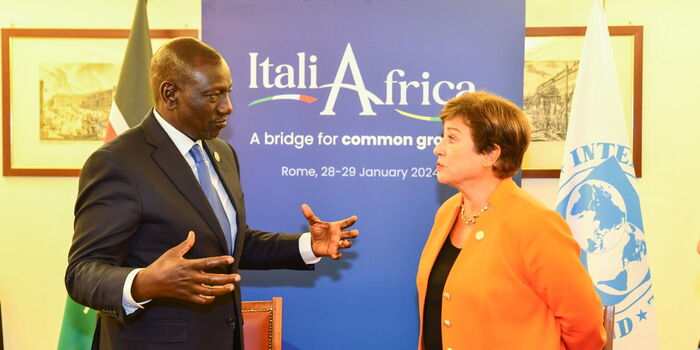Kenya is preparing to return to the negotiating table with the International Monetary Fund (IMF) as the government looks for new loan arrangements to boost the struggling economy.
On Thursday, Prime Cabinet Secretary Musalia Mudavadi confirmed that the National Treasury is working on plans to re-engage the IMF on new areas of financial support and economic cooperation.
Speaking during the Quarterly Diplomatic Briefing in Nairobi, Mudavadi explained that the government’s goal is to secure a well-structured programme that will give Kenya a clearer financial direction and strengthen economic stability.
“The Government of Kenya, through the Treasury, will be engaging with the IMF so that we can work on a new programme,” Mudavadi said.
He added that the new talks will focus on unlocking financing options that can help the country meet its development goals while also stabilising the economy.
The Treasury will soon send a team to officially start discussions with IMF officials, a move that signals Kenya’s commitment to maintaining close ties with international financial institutions.
However, analysts caution that the road back to the IMF will not be smooth. Kenya may first need to repay part of its current debt before the IMF considers a new programme. This could delay the approval of a comprehensive deal until 2027.
One of the main reasons for seeking a new IMF loan is to get additional resources that will make it easier for the government to service its external debts. Talks are expected to officially begin in the next two months.
Kenya had previously secured a four-year, $3.6 billion (Ksh465 billion) IMF deal, which ended in April 2025.
However, the government failed to access the final tranche of about $850 million (Ksh109.9 billion) after struggling to meet key requirements such as reducing the budget deficit and raising more tax revenue.
During the stalemate, the Kenyan government has been exploring alternative ways of raising money. Some of the strategies include selling diaspora bonds, privatising state-owned companies, and refinancing both local and foreign bonds to ease the financial burden in the short term.
Alongside the IMF talks, Mudavadi also revealed that Kenya is working to get its name removed from the Financial Action Task Force (FATF) grey list, where the country was placed due to weaknesses in preventing money laundering and terrorism financing.
According to him, Treasury officials are actively working with international partners and local agencies to meet the required compliance standards.
“We are determined to ensure Kenya is delisted from the FATF grey list,” he said, adding that restoring international trust in Kenya’s financial system is a top priority.
Earlier in June, the European Commission included Kenya in its revised list of high-risk countries with serious gaps in tackling financial crimes. Other countries placed on the list included Algeria, Angola, Côte d’Ivoire, Laos, Lebanon, Monaco, Namibia, Nepal, and Venezuela.
Being on this blacklist means Kenya now faces stricter monitoring and tighter checks on its financial transactions at the global level.
The government hopes that ongoing reforms, combined with renewed IMF engagement, will gradually help repair the country’s financial reputation while unlocking much-needed funding.
Join Government Official WhatsApp Channel To Stay Updated On time
https://whatsapp.com/channel/0029VaWT5gSGufImU8R0DO30


